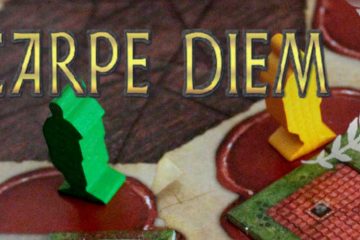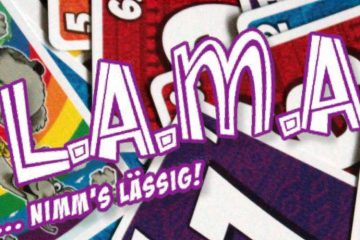Year2018PublisheraleaAuthorStefan FeldPlayers2 – 4Age10 – 199Time45-75StrategyLuckInteractionComponents & DesignComplexityScoreCarpe Diem. The fish of the day, as they say in Latin. It’s an[…]
Read more

Year2018PublisheraleaAuthorStefan FeldPlayers2 – 4Age10 – 199Time45-75StrategyLuckInteractionComponents & DesignComplexityScoreCarpe Diem. The fish of the day, as they say in Latin. It’s an[…]
Read more
Lama is the German word for llama. No big conceptual leap there. L.a.m.a. is, at least in Reiner Knizia’s vocabulary, an abbreviation for “lege alle Minuspunkte ab”. Discard all minus points. You could translate the title by its abbreviation, but then an eventual English edition would be called D.a.m.p., and whatever depiction you pick for that would be much less adorable than the crazy llama L.a.m.a. has. And so the international publishers have stuck with the adorable tylopod.
Linguistics lesson aside, L.a.m.a. is a small box card game that is nominated for the Spiel des Jahres this year. Not at all bad for a relatively simple shedding game and worth a look what makes it special.

Year2018PublisherRepos ProductionAuthorLudovic Roudy, Bruno SautterPlayers3 – 7Age8 – 199Time20StrategyLuckInteractionComponents & DesignComplexityScoreIt’s often one little twist that makes the difference between yet another[…]
Read more
Year2018PublisherHorrible GamesAuthorHjalmar Hach, Lorenzo SilvaPlayers2 – 6 (12)Age8 – 199Time20-30StrategyLuckInteractionComponents & DesignComplexityScoreIt’s hard to miss, the roll-and-write renaissance is in full swing.[…]
Read more
Here we go once more. Better a few days late than never, right? The Spiel des Jahres nominations were, at[…]
Read more
Unbelievable! I get sick for a couple of days and the Spiel des Jahres jury inconsiderately publishes this year’s nomination[…]
Read more
I admit, there are wide ranges of modern art I don’t get. If you put a piece of butter in a corner you shouldn’t complain when the cleaners remove it. And if you want to pass a picture of a trumpet as a masterpiece, at least write Ceci n’est pas une trompette below it. I don’t want to belittle the choice of artwork in Belratti, but if your paintings are realistic depictions of everyday objects then you don’t get to complain about forgeries.
Art forgery is what Belratti by Michael Loth, winner of the Hippodice Game Contest, is about. The players in the cooperative party game are painters and curators. Curators ask for paintings to be made, the painters provide them. The famous forger Belratti smuggles his own works into the selection, and it’s on the curators to unmask his dastardly works.
Read more
One amazing thing games let us do is explore worlds of imagination. Space ships traveling to distant stars are just as possible as dragons or old gods walking the Earth. I can’t think of any game that stretches the borders of imagination as far as Tsukuyumi.
On the surface, the world of Tsukuyumi used to be just like ours. Like Earth, that is. One difference, though – or at least I hope it’s a difference. Thousands of years ago, the white dragon god Tsukuyumi was trapped in the center of the moon by his brothers and sisters. There he lay, plotting, planning, until one day he broke free of his lunar prison by crashing into the Earth. The devastation was absolute. Continents shattered. Mountains crumbled. Oceans fell try. Animals, plants, and especially humanity paid a heavy toll. And amidst all this destruction Tsukuyumi and his army of Oni warriors stand to recapture what was once theirs.

After three games around the North Sea – Explorers, Raiders, and Shipwrights of the North Sea – designer Shem Phillips wanted a change of direction. Literally. So him and co-designer S J Macdonald went to the West Kingdom. The first game in this new trilogy is Architects of the West Kingdom, the sequel Paladins of the West Kingdom was just funded on Kickstarter, we don’t know the title of the third game yet.
The West Kingdom is the 9th century Carolingian Empire, and in the first game the players are architects – don’t act surprised now – construct landmarks and cathedrals for the king.
Read more
I never really enjoyed Taboo much. Once you develop an instinct which words are likely to be banned, it’s actually pretty easy, there are always some people that want to keep playing after I got way bored already, and that buzzer is super annoying. So imagine my lack of enthusiasm when Czech Games Edition announced a game that sounded for all intents and purposes like Taboo with a fantasy theme sprayed on.
Then I actually played Trapwords.
Read more